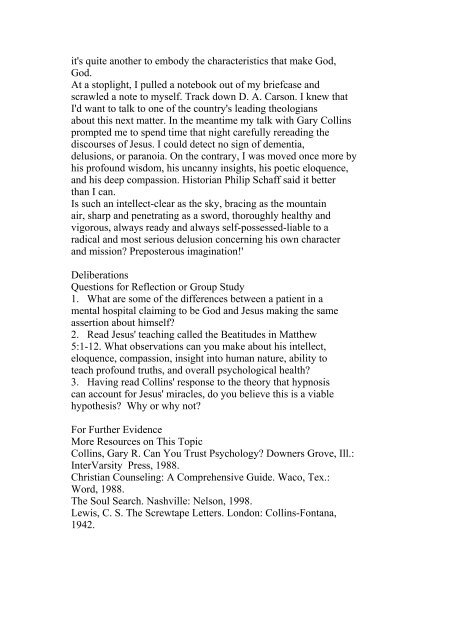The Case For Christ
The Case for Christ records Lee Strobel's attempt to "determine if there's credible evidence that Jesus of Nazareth really is the Son of God." The book consists primarily of interviews between Strobel (a former legal editor at the Chicago Tribune) and biblical scholars such as Bruce Metzger. Each interview is based on a simple question, concerning historical evidence (for example, "Can the Biographies of Jesus Be Trusted?"), scientific evidence, ("Does Archaeology Confirm or Contradict Jesus' Biographies?"), and "psychiatric evidence" ("Was Jesus Crazy When He Claimed to Be the Son of God?"). Together, these interviews compose a case brief defending Jesus' divinity, and urging readers to reach a verdict of their own.
The Case for Christ records Lee Strobel's attempt to "determine if there's credible evidence that Jesus of Nazareth really is the Son of God." The book consists primarily of interviews between Strobel (a former legal editor at the Chicago Tribune) and biblical scholars such as Bruce Metzger. Each interview is based on a simple question, concerning historical evidence (for example, "Can the Biographies of Jesus Be Trusted?"), scientific evidence, ("Does Archaeology Confirm or Contradict Jesus' Biographies?"), and "psychiatric evidence" ("Was Jesus Crazy When He Claimed to Be the Son of God?"). Together, these interviews compose a case brief defending Jesus' divinity, and urging readers to reach a verdict of their own.
You also want an ePaper? Increase the reach of your titles
YUMPU automatically turns print PDFs into web optimized ePapers that Google loves.
it's quite another to embody the characteristics that make God,<br />
God.<br />
At a stoplight, I pulled a notebook out of my briefcase and<br />
scrawled a note to myself. Track down D. A. Carson. I knew that<br />
I'd want to talk to one of the country's leading theologians<br />
about this next matter. In the meantime my talk with Gary Collins<br />
prompted me to spend time that night carefully rereading the<br />
discourses of Jesus. I could detect no sign of dementia,<br />
delusions, or paranoia. On the contrary, I was moved once more by<br />
his profound wisdom, his uncanny insights, his poetic eloquence,<br />
and his deep compassion. Historian Philip Schaff said it better<br />
than I can.<br />
Is such an intellect-clear as the sky, bracing as the mountain<br />
air, sharp and penetrating as a sword, thoroughly healthy and<br />
vigorous, always ready and always self-possessed-liable to a<br />
radical and most serious delusion concerning his own character<br />
and mission? Preposterous imagination!'<br />
Deliberations<br />
Questions for Reflection or Group Study<br />
1. What are some of the differences between a patient in a<br />
mental hospital claiming to be God and Jesus making the same<br />
assertion about himself?<br />
2. Read Jesus' teaching called the Beatitudes in Matthew<br />
5:1-12. What observations can you make about his intellect,<br />
eloquence, compassion, insight into human nature, ability to<br />
teach profound truths, and overall psychological health?<br />
3. Having read Collins' response to the theory that hypnosis<br />
can account for Jesus' miracles, do you believe this is a viable<br />
hypothesis? Why or why not?<br />
<strong>For</strong> Further Evidence<br />
More Resources on This Topic<br />
Collins, Gary R. Can You Trust Psychology? Downers Grove, Ill.:<br />
InterVarsity Press, 1988.<br />
<strong>Christ</strong>ian Counseling: A Comprehensive Guide. Waco, Tex.:<br />
Word, 1988.<br />
<strong>The</strong> Soul Search. Nashville: Nelson, 1998.<br />
Lewis, C. S. <strong>The</strong> Screwtape Letters. London: Collins-Fontana,<br />
1942.

















